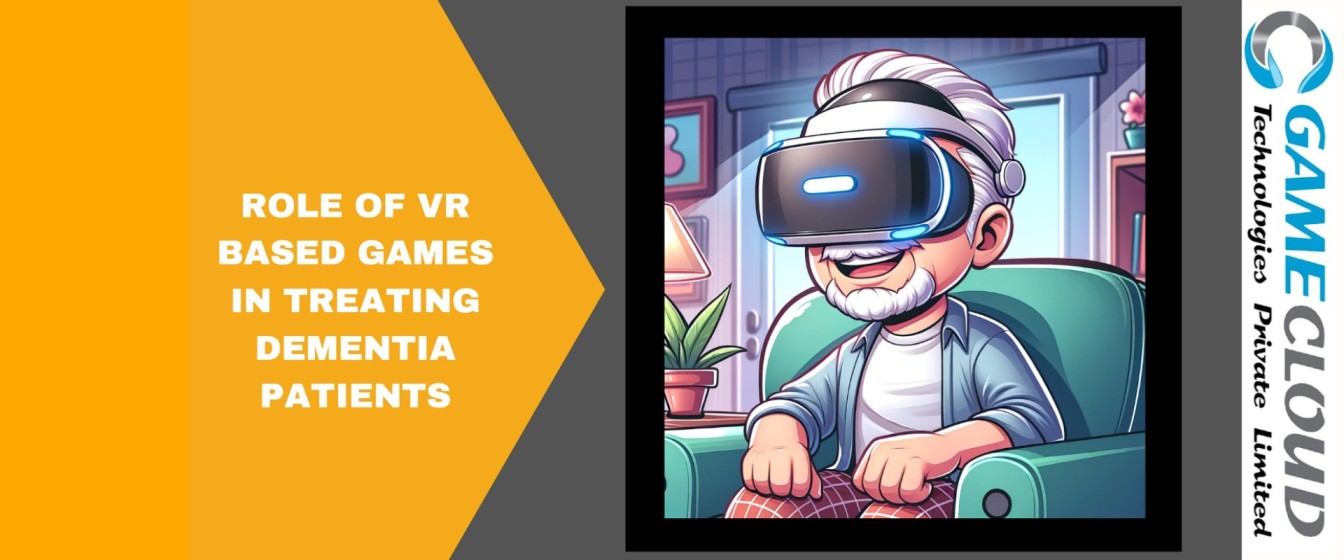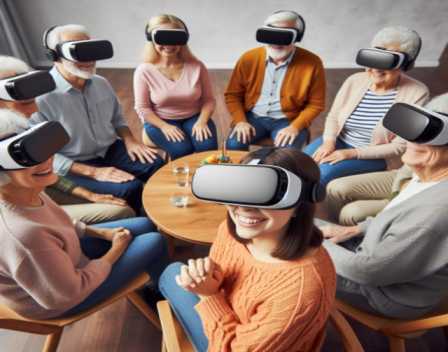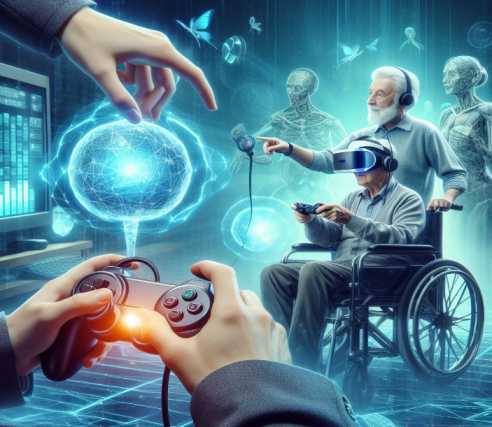
Dementia is a group of symptoms that interfere with daily functioning, affecting memory, language, problem-solving, and other cognitive abilities. It is a broad term that encompasses various conditions, with Alzheimer’s disease being the most common cause. As the population ages, the prevalence of dementia is expected to increase, making it a significant public health concern. Virtual reality (VR) technology has been explored as a potential tool to improve the lives of individuals with dementia, offering a unique opportunity for entertainment, socialisation, and cognitive stimulation.
Causes and Symptoms of Dementia
The causes and symptoms of dementia include various factors that can lead to cognitive decline and interfere with daily functioning. Some common causes of dementia mentioned in the sources are:
- Brain Injuries: Traumatic brain injuries (TBI) can cause memory loss, depression, explosiveness, and impaired speech, contributing to dementia symptoms.
- Immune System Disorders: Conditions where the body’s immune system attacks nerve cells can lead to dementia, such as in multiple sclerosis.
- Metabolic or Endocrine Issues: Thyroid problems, low blood sugar, and imbalances in sodium, calcium, or vitamin B-12 levels can result in dementia-like symptoms or personality changes.
- Nutritional Deficiencies: Lack of essential nutrients like thiamin (vitamin B-1), vitamin B-6, vitamin B-12, copper, or vitamin E can lead to dementia symptoms.
- Medication Side Effects: Some medications or their interactions can cause dementia-like symptoms in individuals.
The symptoms of dementia can vary depending on the cause and may include:
- Memory loss
- Communication difficulties
- Confusion and disorientation
- Problems with reasoning and problem-solving
- Personality changes
- Depression, anxiety, and agitation
- Inappropriate behaviour
- Hallucinations and paranoia
Types of VR-Based Games
VR-based games and applications are designed to engage individuals with dementia in various activities, such as:
- Cognitive Training: Games that challenge memory, attention, and problem-solving skills, helping to maintain cognitive function.
- Social Interaction: Virtual environments that facilitate social interaction, reducing feelings of loneliness and isolation.
- Emotional Expression: Games that allow individuals to express emotions and creativity, promoting emotional well-being.
- Therapeutic Interventions: VR-based therapies that target specific symptoms, such as agitation, aggression, and anxiety.
Benefits of VR in Treating Dementia Patients
The key benefits of using virtual reality (VR) in treating dementia patients include:
- Reducing Aggressiveness: The study found that VR therapy had a statistically significant effect on reducing aggressive behaviours, such as physical aggression and loud vocalisation, in dementia patients.
- Improving Memory and Cognition: VR can help stimulate memory and cognitive function in dementia patients. The studies reported that VR experiences helped patients recall old memories and contributed to an improvement in their relationships with caregivers.
- Enhancing Quality of Life: VR-based interventions can enhance the quality of life for individuals with dementia by reducing feelings of loneliness and increasing social interaction.
- Providing Cognitive Stimulation: VR-based games and activities can provide cognitive stimulation, helping to maintain cognitive function in dementia patients.
Examples of VR programs used in Treating Dementia Patients
Some examples of virtual reality programs used in treating dementia patients include:
- Virtual Environments: Patients with dementia accessed five different virtual environments, including a cathedral, a forest, a sandy beach, a rocky beach, and the countryside, over 16 sessions. These environments helped patients recall old memories and improve their relationships with caregivers.
- Personal Space Option: Virtual reality creates a “personal space” option for patients in long-term care, allowing them to experience activities they may no longer have access to in daily life due to their declining health and secure environments. This personalised approach can provide relaxation and respite for dementia patients.
- Tranquil Scenes: Tranquil virtual reality scenes have been found to effectively distract patients, reduce stress levels without medication, and help uncommunicative patients speak more. These experiences can deepen interactions between caregivers and patients, offering unique insights into the lives of dementia patients.
- A Walk Through Dementia: Alzheimer’s Research UK has developed “A Walk Through Dementia” videos, offering 360-degree experiences designed to immerse viewers in the shoes of someone living with dementia in everyday situations. These videos aim to increase understanding, empathy, and awareness of the challenges faced by dementia patients.
How does virtual reality compare to traditional treatments for dementia?
Virtual reality (VR) has emerged as a promising tool for treating dementia, offering unique benefits compared to traditional treatments. One major advantage of VR is its ability to provide personalised and engaging experiences tailored to individual patients. Unlike traditional treatments that may lack customisation, VR allows developers to recreate specific environments, such as a patient’s home or a meaningful place, using 360-degree video. This personalised approach can enhance the effectiveness of interventions by triggering memories and emotions that are difficult to replicate in standard care settings.
Moreover, VR offers a novel way to stimulate memory and cognition in dementia patients. Studies have shown that VR experiences can help individuals recall old memories, contributing to improvements in their relationships with caregivers and overall quality of life. The immersive nature of VR environments can engage patients in cognitive tasks, social interactions, and emotional experiences, providing a richer and more satisfying quality of life than traditional treatments.

In terms of effectiveness, VR has shown promising results in reducing aggressiveness and improving well-being in dementia patients. Research indicates that VR therapy can significantly reduce aggressive behaviours and enhance mood and engagement levels among patients. Caregivers have reported deeper and improved interactions with patients after VR sessions, suggesting that VR can offer valuable insights into patients’ lives and enhance the caregiving experience.
While traditional treatments for dementia often focus on pharmacological interventions or standard cognitive exercises, VR stands out for its ability to provide a multi-sensory and interactive experience that can address cognitive, emotional, and social aspects of dementia care. By offering a more holistic approach to treatment, VR has the potential to complement traditional therapies and enhance the overall well-being of individuals living with dementia. Further research and development in the field of VR for dementia care are essential to fully understand the comparative benefits and limitations of VR versus traditional treatments and to optimise the use of this innovative technology in improving the lives of dementia patients.
Technical Requirements & Challenges for Implementing VR programs in aged-care settings
The technical requirements for implementing virtual reality programs in aged-care settings include:
- User-Friendly Technology: The VR technology used should be user-friendly, comfortable, and easy to clean to ensure accessibility for older adults in aged-care settings.
- Internet Connectivity: Ensuring stable internet connectivity is crucial to avoid technology issues that may hinder the implementation of VR programs in aged-care settings.
- Adequate Staffing: Having sufficient staff to assist with the VR program is essential, as staff attitude, worries, and impact on residents are key barriers that need to be addressed for successful implementation.
- Safe Environment: Providing a safe environment for residents to experience VR is paramount. Residents should be informed that they can stop the experience at any time and should feel in control of the VR session.
- Physical Space: Allocating an indoor space with ample lighting and a clear floor area of 2m x 2m is necessary for VR sessions. This space should allow for head and arm movement, whether residents are seated or standing, to ensure a comfortable and engaging experience.
- Equipment: Having VR headsets, controllers, and necessary accessories in good working condition is essential for a smooth implementation of VR programs in aged-care settings.
- Occupational Health and Safety: Completing an occupational health and safety assessment to ensure the safety of residents during VR sessions is crucial. Providing anti-bacterial wipes and spare silicon face covers can help maintain hygiene standards.
- Session Planning: Scheduling VR sessions for residents, with sessions running for approximately 60-90 minutes and residents aiming to stay in VR for 5-10 minutes before taking a break, is important to prevent fatigue and ensure a positive experience.

The implementation of virtual reality (VR) programs in aged-care settings is associated with several challenges, including:
- Residents’ Mobility Constraints: Some residents may have mobility issues that make it difficult for them to move around and interact with the VR environment.
- Difficulty Providing Guidance and Support: Caregivers may need to provide guidance and support to residents using VR, which can be challenging due to the complexity of the technology.
- Logistics and Learning Curve: The logistics of implementing VR, such as installing and operating the equipment, can be complex and require a learning curve.
- Face-to-Face Communications: The use of VR can reduce face-to-face communications between caregivers and residents, which can be a challenge in aged-care settings where personal interaction is important.
- Lack of Suitable Standards: The lack of suitable standards for VR in aged-care settings can make it difficult to ensure that VR experiences are safe and effective.
- Evaluation and Monitoring: Evaluating and monitoring the effectiveness of VR in aged-care settings can be challenging, requiring the development of suitable metrics and evaluation tools.
- Ethical Considerations: Ethical considerations, such as the potential impact of VR on residents’ mental and physical health, can be a challenge in implementing VR in aged-care settings.
How does VR help in even entertaining old or serious Patients?
One of the key benefits of VR for dementia patients is its ability to evoke feelings of nostalgia and positivity by allowing them to revisit meaningful experiences from their past. This can be particularly beneficial for those with middle-stage dementia, as it can help improve their moods and behaviours.
VR can also be used to provide adventure and entertainment, which can be especially important for older adults who may be experiencing physical limitations or mobility issues. By allowing them to explore new places and activities through VR, older adults can experience a sense of adventure and excitement that may not be possible in their daily lives.
In addition to its entertainment value, VR has been shown to have physical, mental, and social benefits for older adults. It can help keep the brain active, promote movement, and provide educational opportunities. VR can also be used to ease physical pain and help manage chronic diseases by providing a distraction during medical procedures.
Furthermore, VR can be used to strengthen relationships between older adults and their families. By providing a fun and interactive activity for families to participate in together, VR can help bridge the physical distance between them and promote intergenerational connections.
Overall, VR has the potential to make a significant impact on the lives of older adults, including those with dementia. By providing a new form of entertainment and engagement, VR can help improve their quality of life and provide a sense of adventure and excitement that may not be possible in their daily lives.
LolzSoft and QualityReality: Redefining the Gaming Landscape for Dementia Patients
LolzSoft, a sub-brand of GameCloud Technologies Pvt Ltd, is indirectly contributing to the development of VR-based games that can potentially help in the treatment of dementia patients. By providing game development experience, LolzSoft is creating a new era in cutting-edge video design and development, which can lead to the creation of immersive and engaging games that can be used in therapy settings. These games can be designed to stimulate cognitive function, provide emotional support, and offer a sense of adventure and excitement, all of which are essential for individuals with dementia.
Moreover, LolzSoft’s focus on crafting games that redefine the gaming landscape can lead to the creation of games that are not only entertaining but also educational and inspiring. This dual focus can result in games that are tailored for both kids and adults, allowing them to learn in an engaging and enjoyable environment. The company’s expertise in Rapid Game Prototyping has set them apart in the industry, allowing for quick development and testing of new game ideas, ensuring that only the most engaging and innovative concepts make it to the market.
Complementing LolzSoft’s game development efforts, GameCloud Technologies’ division, QualityReality.com, specializes in XR (Extended Reality) and Metaverse services. This team of experts is dedicated to pioneering Extended Reality solutions, offering comprehensive testing and development on XR platforms. By ensuring the quality and effectiveness of VR experiences, QualityReality.com plays a crucial role in the development of VR-based therapies for dementia patients, helping to create immersive and engaging experiences that can positively impact their well-being.
Together, LolzSoft and QualityReality.com are redefining the gaming landscape and paving the way for innovative VR-based solutions that can enhance the lives of dementia patients, providing them with engaging experiences that stimulate their cognitive abilities, evoke positive emotions, and offer a sense of adventure and connection.
Conclusion
VR-based games and applications offer a promising avenue for improving the lives of individuals with dementia. By providing cognitive stimulation, social interaction, and emotional expression, VR technology can help to reduce symptoms, improve quality of life, and enhance the overall well-being of individuals with dementia. While challenges and limitations exist, the potential benefits of VR in dementia care make it an area worth further exploration and development.
